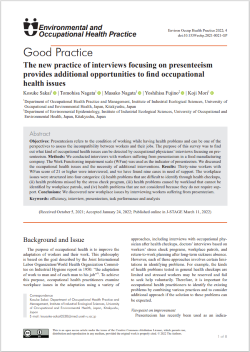#E0046 The new practice of interviews focusing on presenteeism provides additional opportunities to find occupational health issues

Tackling the Presenteeism Problem: Approaches to Address Occupational Health Issues and Improve Work Productivity
Occupational health goals focus on promoting adaptability of employees to their work. Work productivity and adaptability are closely linked to the overall health and wellbeing of employees. Occupational health professionals, therefore, assess adaptation-related workplace issues through regular employee health checkups, stress evaluation, and interviews with occupational health physicians. However, these general checkups may fail to detect specific health issues or stress-related problems that employees are reluctant to discuss.
‘Presenteeism’ or the practice of showing up for work when ill, has recently been used as an indicator of health-related workplace issues that affect productivity. Group studies have evaluated presenteeism at work and identified musculoskeletal pain and psychiatric disorders as the major causes of maladaptation to work. However, there is limited data on specific obstacles at work related to presenteeism at the individual worker level.
In this survey, researchers from Japan interviewed individual workers suffering from presenteeism in a food manufacturing company, to understand their occupational health issues. They used the Work Functioning Impairment Scale or ‘WFun’ to identify workers with high or average work impairment issues due to presenteeism. Thirty-nine workers with a Wfun score of 21 or higher were interviewed. Among them, nine workers were found to require additional support by their occupational therapists.
Further, the survey classified the occupational health issues identified from the interviews into four categories. The first category comprised health issues that are difficult to detect through regular checkups, such as sleep apnea. The second category included issues that are missed in the stress-check programs, like interpersonal conflicts at the workplace that can cause psychological stress. The third category identified physical health issues caused by workload or the workplace environment, including repetitive tasks like heavy lifting leading to acute back pain. The fourth category included health problems that did not require assistance or did not worsen with time.
In addition to identifying the causes underlying presenteeism, this study also highlights measures to improve work productivity. Occupational therapists may suggest support programs, or provide advice related to a change or improvement in workplace conditions, to workers seeking consultations. Furthermore, the study sheds light on other aspects like workplace harassment and lack of suitable training opportunities, which can hamper work productivity. Similar surveys across different industries can significantly enhance occupational health practices, thereby improving productivity.

Link to original journal article:
https://www.jstage.jst.go.jp/article/eohp/4/1/4_2021-0021-GP/_article
Title of the paper:
The new practice of interviews focusing on presenteeism provides additional opportunities to find occupational health issues
著者:
Kosuke Sakai, Tomohisa Nagata, Masako Nagata, Yoshihisa Fujino, and Koji Mori




